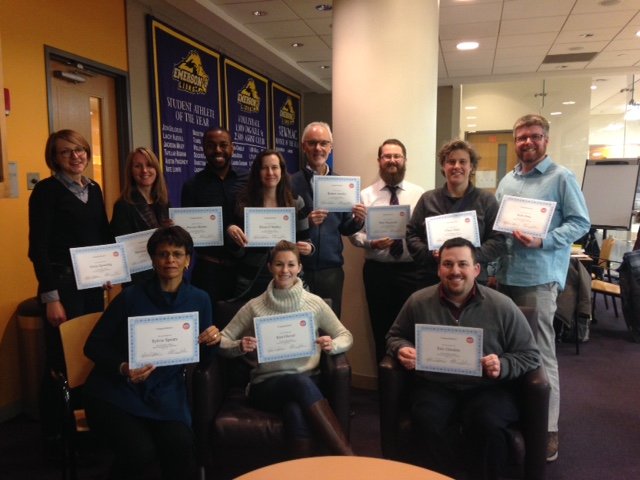Emerson Launches Active Listening Program Aimed at Diversity Issues

Need to talk to someone about issues of race, ethnicity, sexuality, or anything else? Emerson staff members are here to listen.
The first “class” of 12 Brave Space Project volunteers has completed nine hours of training in how to be “active and supportive” listeners. You’ll know who the Brave Space Listeners are by the stickers outside their office doors or on their mailboxes.
“We now have well-trained people to be supportive and active listeners in any area of diversity and inclusion, culture and social identity, or social justice,” said Director of Inclusive Excellence Robert Amelio, who organized the training. “We’re creating an environment where a person can come in and feel listened to. If they want resources, we can get them those.”

Brave Space is modeled after the Safe Space Project, which is implemented on college campuses across the country and is focused on LGBTQ students, Amelio said.
Issues of sexuality and gender identity are welcome in Brave Spaces, but because Emerson already has a number of supports for LGBTQ students, the Division of Diversity and Inclusion decided to expand it to include topics that many are less comfortable talking about: race, ethnicity, class, religion, and other diversity issues. It’s available to Emerson students, faculty, and staff.
According to a Brave Space mission sheet, the project also aims to enhance Emerson community members’ understanding of issues around “diversity, intersectionality, oppression and bias, and intercultural fluency” and provide more opportunities for wider discussions of these issues among faculty, staff, and students.
The volunteers have committed to six additional hours of training per year, in order to keep their skills fresh, Amelio said.
He said Diversity and Inclusion will get feedback about what did and didn’t work from the first group to go through training, and offer another one in the summer or fall. The goal is to eventually train faculty and students too, so that Brave Space Listeners will be in every corner of the campus.
Chris Daly, director of retention and student success, was one of the staff members trained in the first cohort.
“Hopefully, as the program grows, the number of colleagues who are actually engaged in this conversation can grow,” Daly said.
She said while the Brave Space Project has been in the works for well over a year, an initiative like this is as important now as it’s ever been, between the political climate, documented cases of police brutality against African Americans, and the toxic rhetoric and new policies around immigrants.
“Issues of identity and belonging and diversity, they are really, really important [conversations] to be having, and we want Emerson to be a place where [students, faculty, and staff] feel safe, and where we’re pushing people to think about these things,” Daly said.
Categories